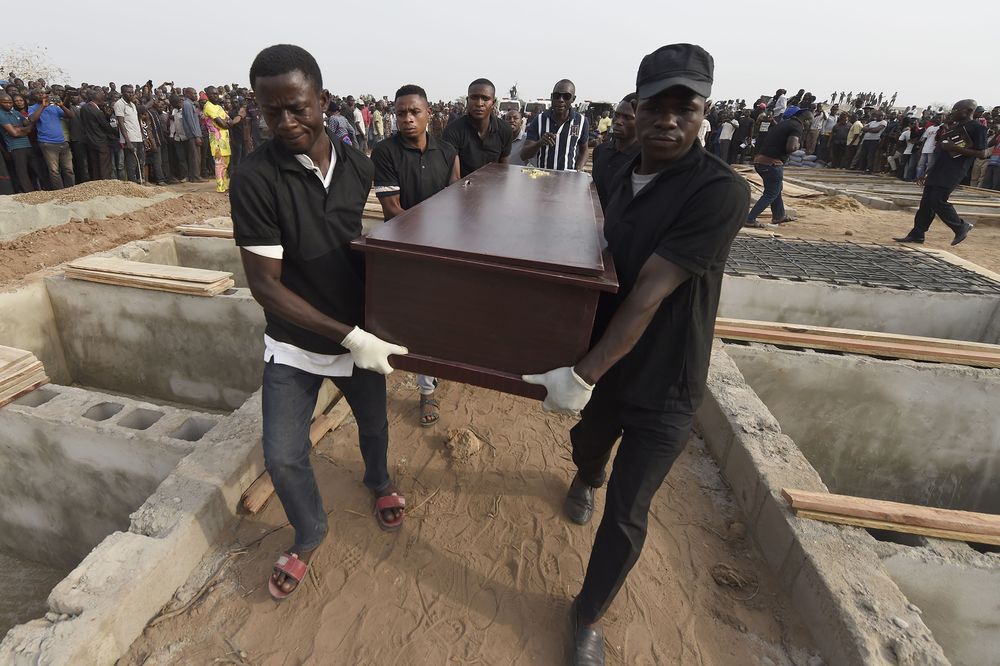
Photographer: Pius Utomi Ekpei/AFP via Getty Images
Centuries-old communal tensions across West Africa are taking an increasingly bloody turn, fueled by competition for land and water and an influx of weapons and fighters from Libya.
Nigerian President Muhammadu Buhari has blamed that cocktail of guns and gunmen for the intensifying clashes between crop farmers and herders as well as robberies and kidnapping by bandit gangs. The violence is stoking Nigeria’s ethnic and religious divisions and is rivaling Boko Haram’s nine-year-old Islamist insurgency in the northeast as the nation’s biggest security crisis.
The fallout from the downfall of Moammar Qaddafi’s regime in Libya almost seven years ago is worsening conflict in Nigeria and other countries in the region such as Mali and Niger where al-Qaeda- and Islamic State-inspired groups operate, according to analysts including Nnamdi Obasi of the Brussels-based International Crisis Group.
“Some arms looted after Qaddafi’s fall have been acquired by various groups, including Islamist insurgents, cattle rustlers and other bandits, herders and farming communities, aggravating conflicts and insecurity in northern Nigeria,” he said in an interview. “Secondly, some of the fighters that fled Libya have reportedly offered mercenary services to groups in conflict elsewhere or probably formed deadly bandit groups themselves.”
Bandit Gangs
While Buhari’s administration has made some progress in weakening Boko Haram’s insurgency, the office of Senate President Bukola Saraki last week said 937 people were killed in attacks by gunmen and in the farmer-herder violence from Jan. 1 to April 30. Civic groups say about 170,000 people have been forced to flee their homes in Benue state alone.
The proliferation of small arms has played a role in expanding the conflicts, but the government must couple its security efforts with a focus on dealing with environmental change, said Idayat Hassan, executive director of the Abuja-based Centre for Democracy and Development. Issues the authorities must deal with include a constant shift in human and livestock population, the state’s weak capacity and the rise of criminality and insecurity in rural areas, she said.
In the latest attack on May 5, at least 48 people were killed in the town of Gwaska, 330 kilometers (205 miles) northwest of the capital, Abuja, by unidentified gunmen the authorities described as bandits. A similar raid on villages in northwestern Zamfara state on April 20 left 30 people dead.
Priests Murdered
National attention is now focused on the worsening violence between mainly Christian farmers and predominantly Muslim herders who are increasingly moving into the Benue River valley for pasture as the Sahara Desert inches steadily southwards.
An attack last month on a Catholic church in Benue state, in which 19 worshipers, including two priests, were killed, has roused religious sentiments in a country almost evenly split between a mainly Muslim north and a predominantly Christian south.
Thousands of people attended rallies in Abuja and other cities on Tuesday after the Catholic Bishops Conference urged Nigeria’s 30 million Catholics to stage protests against the killing of innocent Nigerians, irrespective of their ethnicity or religious faith.
Election Impact
With general elections due in February, the farmer-herder conflict is likely to feature among the emotive issues, said Imad Mesdoua, an analyst at London-based Control Risks Group.
“The reality is that the conflict will become increasingly politically sensitive in the coming months as campaigning for the 2019 elections begin,” he said. “Both sides of the political spectrum will seek to use the issue to score electoral points.”
In this spiraling conflict, farming communities have been encouraged by senior figures such as former army chief Theophilus Danjuma to protect themselves. This has run the risk of sparking further violence. In the Benue town of Gboko in February, at least 10 ethnic Fulanis were attacked and lynched by a mob days after an attack on a rival community was reported.
Buhari’s government has drawn criticism for being too slow to respond to the attacks and relying too much on military solutions to stop them. Unless the authorities move more quickly to stop the raids and prosecute those responsible, local communities will resort to arms, according to Osai Ojigho, director of Amnesty International Nigeria.
“The need for self-defense has led to an increase in demand of weapons,” she said, “Until security is restored, people will continue to seek out black-market traders.”


One Response
my husband left me with two kids, I felt like ending it all, i almost committed suicide because he left us with nothing, i was emotionally down all this while. Thanks to a love doctor called Dr. Mack the love doctor which i met online. On one faithful day, as I was browsing through the internet, I came across several of testimonies about this particular love doctor. Some people testified that he brought their Ex lover back, some testified that he restores womb,cure cancer,and other sickness, some testified that he can cast a spell to stop divorce. He is amazing, i also come across one particular testimony, it was about a woman called Vera, she testified about how he brought back her Ex lover in less than 2 days, and at the end of her testimony she dropped his email. After reading all these, I decided to give it a try. I contacted him via email and explained my problem to him. In just 48hours, my husband came back to me. We resolved our issues, and we are even happier than ever .Dr. Mack you are a gifted man and i will not stop publishing him because he is a wonderful man. If you have a problem and you are looking for a real and genuine love doctor, Try him anytime, he is the answer to your problems. you can contact him on( dr_mack @ YAHOO .com) he is the best love doctor that can help you with your problems relationship.